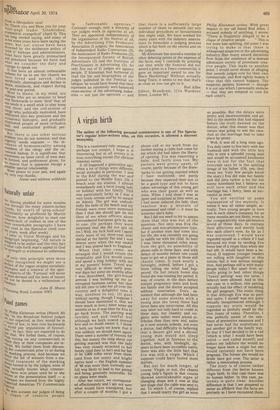l 'anel games th . Philip Kleinman writes (March 30) in
the Broadcast festival judges not expected, as they would be in ■ toe°11n of law, to lean over backwards tit avoid any imputations of favouriju'rn." In fact, they are expected to do frost that. We forbid them, of course, 1 \i,h!ri voting on any commercials in voi leh they or their companies are in
• ,
illavted. We forbid them from discussthe the e commercials prior to or during 1 . Marking process. And because we '1renve the list of winners from a stast' ,sh 'cal treatment of the marking i theets turned in by the judges, none of 14111 actually knows what commerla,Zs have won prizes until he or she at the presentation itself — a re';"rlique we learned from the highly ,r'Pected American TV Commercials 1 estivai. Ile also accuses our judges of being ' a clique of creative people i
in . . . fashionable agencies."
Curiously enough, only a minority of our judges work in agencies at all. They are appointed, independently of the organisation of the festival at all, by the Advertising Film Producers' Association (5 judges), the Association of Independent Radio Contractors (3), the Association of Radio Producers (3), the Incorporated Society of British Advertisers (5) and the Institute of Practitioners in Advertising (5). So only five out of 21 judges are agency people. If Kleinman had bothered to read the list and biographies of the judges published in our Festival catalogue, he would have found that they represent an extremely well-balanced cross-section of the advertising industries — not just the agencies — and that there is a sufficiently large number of them to smooth out any individual prejudices or favouritisms that might exist. We have worked for many years with the industry associations to formulate a judging process which is fair both on the entries and on the judges.
Mr Kleinman has scored a number of other debating points at the expense of the facts; may I conclude by pointing out that while the Festival did not award a prize to a Tesco commercial, it gave an important award to one for Mace Marketing? Without actually being Tesco, it seems to me that that's as close as you can get to it.
Rod Allen Editor, Broadcast, Illa Wardour Street, London WI.
Philip Kleinman writes: With great respect to my old friend Rod Allen, I accused nobody of anything. I wrote: "There is frequently alleged to be a clique of creative people . . . " This is not Mere hair-splitting, the point I was trying to make is that there is widespread suspicion in the advertising industry that many award decisions flow from the existence of a mutual admiration society of prominent creative people. This leads to another point: I would never dream of alleging that awards judges vote for their own commercials, and Rod rightly makes it clear that this cannot happen. The suspicion persists, however — though it is not one which I personally endorse — that they are tempted to vote for each other's.


































 Previous page
Previous page